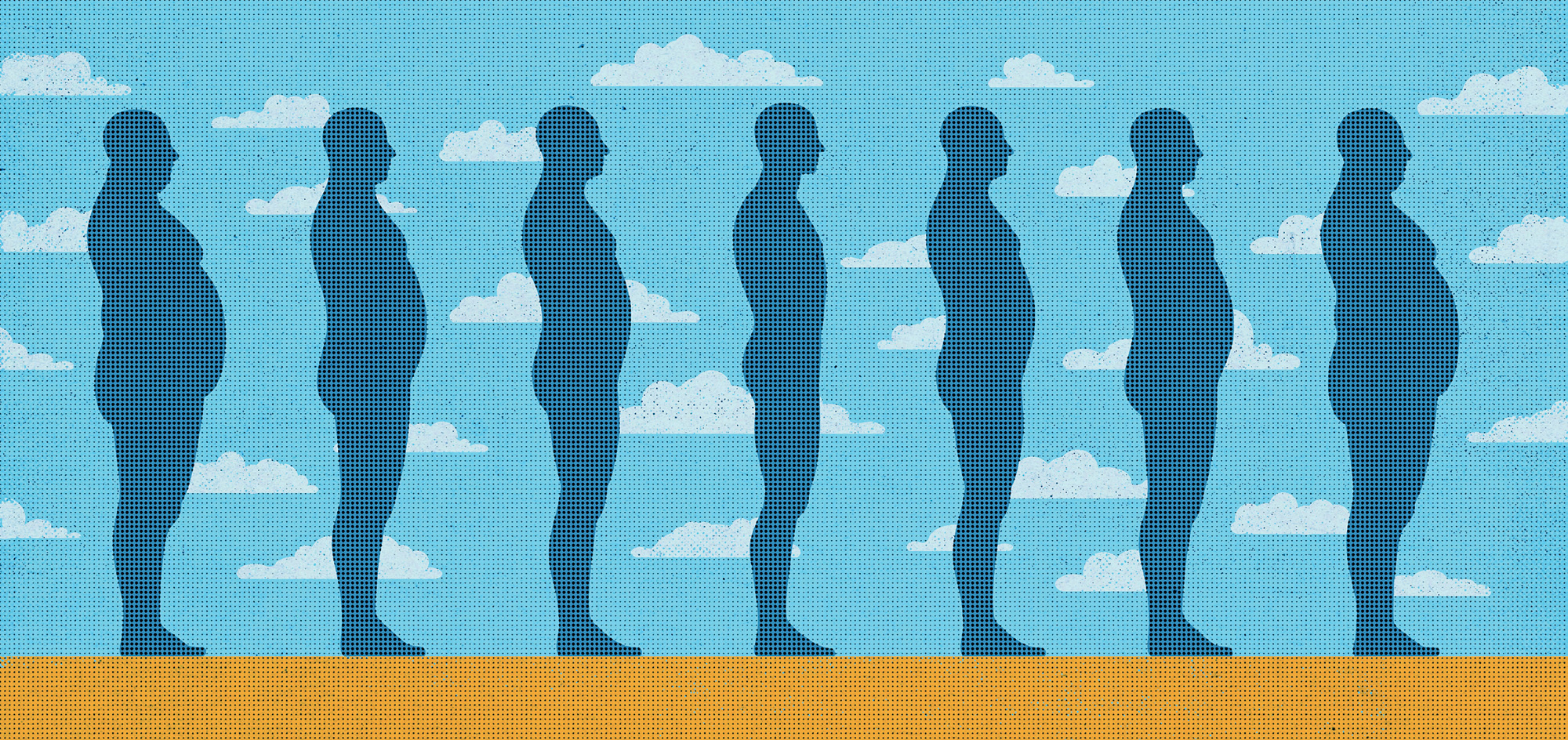
Michael Rosenbaum, a professor of pediatrics and medicine at Columbia University Medical Center, is one of the world’s leading experts in obesity. He also directs the new Columbia University FIT Center — Families Improving Health Together — a specialized clinic at the Morgan Stanley Children’s Hospital dedicated to helping obese children control their weight. We asked Rosenbaum to explain his research on weight loss and metabolism.
How did you come to develop an expertise in weight loss?
In the mid-1980s, after I finished my pediatrics residency at Columbia-Presbyterian Babies Hospital, I became interested in basic research — particularly in studying the biology of obesity. Someone suggested that I talk to Dr. Rudy Leibel at Rockefeller University.
The prevailing idea at that time — one that still persists — was that weight gain was due to sloth and gluttony, and Rudy was collaborating with the late Dr. Jules Hirsch, also at Rockefeller, on a series of studies examining whether obesity was the result of “character failure” or biology.
I was honored when they invited me, a young scientist, to join their laboratory. Dr. Hirsch passed away in 2015, but my close collaboration with Rudy (now also a Columbia faculty member) has continued to this day.
The study you worked on with Dr. Hirsch and Dr. Leibel was a landmark. It changed our thinking about the biology of obesity.
It did. We admitted more than 150 healthy adults — some lean, some obese — to a clinical research center for an average of nine months. Their diets and activity were tightly controlled, and our subjects were meticulously studied before and after losing at least 10 percent of their body weight.
One of our main findings was that both during and after weight loss, our bodies fight back by decreasing how many calories we burn and increasing our appetites.
It doesn’t matter if you start out lean or obese. After weight loss, multiple systems in our bodies work hard to restore us to our original weight.
Is there an evolutionary reason for this?
Absolutely. Early humans were subjected to frequent periods of poor access to nutrition. Those who were best at storing fat calories when food was available, and conserving them when it wasn’t, were most likely to survive and reproduce.
Not surprisingly, we are richly endowed with traits that defend the storage of calories as fat. Thus, after losing weight, your metabolism is probably slower and your appetite is probably greater. And they will probably stay that way if you keep the weight off. Once you regain the weight you’ve lost, your appetite and metabolism will return to earlier levels. If somebody loses 10 percent of their weight and they want to stay at that new low, they’ll then need to eat three to four hundred calories less a day than someone who’s naturally at that lower weight.
Another important conclusion was that losing weight and keeping it off are different. The genes, metabolism, and behaviors predicting how much weight you’ll lose are not the same as those predicting how much you’ll regain afterward. So you need separate therapies for weight loss and weight maintenance. To keep it off, you must actively work to reverse the biological changes induced by weight loss.
Is that why contestants on television programs like The Biggest Loser often regain their weight?
After losing large quantities of weight, the bodies of the contestants are, presumably, not where they want to be. All the systems favoring weight regain are on red alert.
So, once people have lost weight, they must change their lifestyles — either by eating fewer calories or by changing their exercise patterns. The Biggest Loser contestants lost their weight in a highly controlled environment, with significant incentives. Outside of that environment, it’s hard to escape the biology of weight regain.
I don’t like these sorts of programs. They are the modern version of the spectacles at the Roman Coliseum. There shouldn’t be entertainment value in somebody’s medical problem.
Is there a basic formula for weight loss?
The best way to lose weight is to burn more calories than you eat. You can work both sides. You can eat less. You can exercise more. Hopefully, you’ll do both.
The problem is that the more you lose, the more your metabolism slows down. At some point, your body is going to say “that’s enough” and you’re not going to lose more.
We often hear about some new drug that is certain to change everything about weight loss. Are the new pharmaceuticals helpful?
There are no miracle drugs yet. What’s out there and has FDA approval works by decreasing food absorption, decreasing appetite, or increasing the metabolism.
Going forward, I believe these can all be more effectively deployed by combining them with some other drugs already on the market but not currently approved specifically for treating obesity.
I’m excited by the potential of medications currently in development that affect the leptin-signaling pathways. They may help us maintain fat loss by fooling our bodies into thinking we haven’t lost weight. Leptin is a hormone that plays a pivotal role in our losing weight and then regaining it later. Low leptin levels provoke many of the changes that make it so hard to lose weight and keep it off.
I also believe that within a decade, precision medicine — customized treatments — will have a huge effect. We’re going to see ways of identifying the best therapy for somebody in advance of their losing weight. There will be certain genetic, biological, and behavioral testing that will predict what you need to do to be successful. At our FIT program we’re already doing some of that.
Tell me more about the FIT Center and why you have made it your life’s work to study and treat the special problems of overweight children.
As we’ve discussed, most adults find it really hard to lose weight and keep it off. Only about 15 percent are successful. That number hasn’t changed in thirty years.
Children seem to do much better. They are better able to make changes in their lifestyles. Because they’re growing, they usually don’t have to lose weight — only slow down weight gain so they gain inches faster than they gain pounds. They can become slimmer over time and sustain that.
At the FIT program at CUMC, we blend genetics, physiology, and behavioral science to identify the characteristics of a child that are most treatable. For example, if we find that a child has very high triglycerides, we will work with the family and our nutritionist to create a diet — with foods that the child likes and are easy to prepare — that addresses that need.
Our team of experts in pediatric endocrinology, gastroenterology, cardiology, molecular genetics, nutrition, and exercise work together to provide the best possible care and, at the same time, learn more about childhood obesity to the point that it does not persist into adulthood.
What makes your FIT program different from other types of services available to obese children?
Unlike most if not all similar clinics, which require referrals to multiple subspecialists, the FIT program offers all the help and encouragement the young patient needs, in one visit, at one place. The program is modeled after Columbia’s highly successful Naomi Berrie Diabetes Center, which works with adults. We’re still looking for a primary sponsor for the center, and we think that over the long term, this is the most effective way to address the obesity epidemic.
With adults, what is your opinion of the various gastric surgeries?
On the whole, they result in more rapid and greater weight loss than other options. Generally, the amount of weight loss by Lap-Band surgery is about 15 percent. It’s usually more if you have gastric-sleeve or gastric-bypass surgery. As with most interventions, the weight-loss period lasts about six to eight months and is often followed by some regain. One bonus here: the more dramatic procedures often result in a rapid improvement in type 2 diabetes, which along with hypertension and fatty disease is a common complication of obesity. My hope is that we can develop non-surgical means to induce the same changes in the body.
Are Americans more obese than ever?
The world is more obese than ever. Not just Americans. China is having the same problem. We’ve increased access to calorically dense foods. We supersize things. At the same time, we’ve become more sedentary. At this point, 70 percent of the American population is overweight or obese.
So what would you tell a relative who needed to lose weight?
I would tell them that this is a biological disease. It’s not their fault. I would tell them that losing weight is hard, and that if they can’t do it I’ll still love them for trying. I would also say that within a decade we’re likely to have ways to make it easier.



